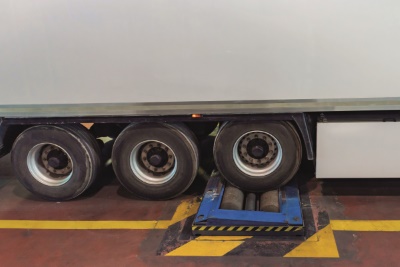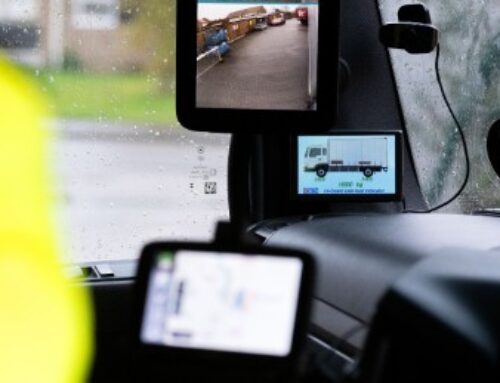Brake testing Q&A with BPW
 In the wake of DVSA’s move to mandatory laden brake testing for goods vehicles and trailers from January 2023, technology provider BPW has issued advice that addresses a number of frequently asked questions surrounding the testing process.
In the wake of DVSA’s move to mandatory laden brake testing for goods vehicles and trailers from January 2023, technology provider BPW has issued advice that addresses a number of frequently asked questions surrounding the testing process.
I failed my brake test: what do I do?
If the service brake circuit performance has failed, BPW advises checking the foundation brake for correct functionality and condition, ensuring the lining material is not low, and inspecting the drum or disc brake for contamination. Additionally, check the camshaft on the drum brake for seizure, the guide pins on the caliper for seizure or wear, and verify that the brake setup matches the brake calculation plate and that the correct DTp number has been used.
The DTp “is the Department for Transport (DfT) number related to the braking information for the vehicle/trailer,” explained BPW.
“This must be accurate to perform the test. The entire evaluation will be void if this is incorrect.”
Suppose the test has failed on the park brake performance. In that case, BPW says, the same checks listed above should be made – and in addition, the firm advises to check for a weak or broken spring in the brake chamber; and checking that the mounted brake chambers match the brake calculation.
Are there any vehicles that are exempt?
DVSA’s Heavy vehicle brake test: best practice guidance (Section 2.1) does offer a list of some instances where the agency may allow an unladen test, points out BPW. These include vehicles designed for and normally carrying obnoxious loads (for example, food/animal/human waste), livestock (e.g. horses, sheep, cattle) or perishable liquids or goods vulnerable to contamination (e.g. liquid/powder tankers, concrete mixers).
Vehicles with low load-bearing ability or false floors (such as furniture removal vehicles) or those with small or restricted loading or access through openings (like catering vans, mobile libraries, and bullion or compactor vehicles) may also be allowed an unladen test.
What about tri-axle semi-trailers?
“Unladen tests on tri-axle semi-trailers are possible,” said the firm.
“This is due to the fact that obtaining a cargo for these trailers can be challenging. However, presenting a fully laden trailer is the best method to pass a brake test as this allows the brakes to be tested under operational loads or conditions to pass a brake test.
My vehicle failed on a brake imbalance. Can I drive it back to the depot to be repaired?
“When you’re braking, each brake should be applied with the same level of force,” advised BPW. “Your vehicle will then be able to brake easily without pulling to one side. When the amount of power generated by each brake on an axle varies, there is a brake imbalance.”
The company identifies several issues that can contribute to brake imbalance, including uneven brake pad or shoe wear, worn discs or drums, a damaged piston, or damage to the brake calliper.
Outlining why a vehicle could fail with a brake imbalance, BPW said: “Imbalance across an axle is calculated using the maximum brake efforts at each wheel. These are shown in the results in kilograms, along with the imbalance across an axle as a percentage. If the brake imbalance exceeds 30 per cent, the vehicle will fail.
“However, if one tyre locks and requires less braking force than the other, or if both wheels lock, this rule is not applicable.
“If your vehicle fails any of these checks, the result will be shown under the ‘unsatisfactory wheel performance’  header at the bottom of the report. However, you can drive the vehicle back with caution unless the DVSA inspectors issue a prohibition.”
header at the bottom of the report. However, you can drive the vehicle back with caution unless the DVSA inspectors issue a prohibition.”
What are the main things I need to watch out for?
BPW highlighted insufficient loads on axles as one issue to bear in mind. The DVSA’s Heavy vehicle brake test: best practice guidance instructs those loading vehicles for the test to “aim to apply at least 65 per cent – and not less than 50 per cent – of the design axle weight to each axle.”
BPW said: “Testing an empty trailer will result in less braking force being applied, the brakes locking sooner than they should, and a meaningless positive test result that fails to indicate whether the vehicle will be able to stop safely.”
The company also addressed the issue of passing on locks only.
“It is possible for a test outcome to indicate a pass even if a braking system’s brake effectiveness fell short of the necessary pass value, which can happen when a brake test is conducted with inadequate weight over the axles,” advised BPW.
“Any imbalance in the brakes on either side of an axle can cause the vehicle to pull to one side. Unless it passes on locks, an imbalance of over 30 per cent will result in a test fail. Any discrepancies over 10 per cent should be investigated and rectified to resolve the imbalance seen.”












